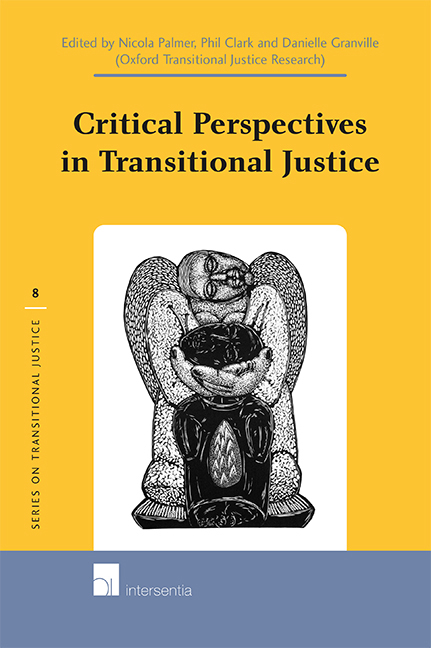Book contents
- Frontmatter
- Note
- Acknowledgements
- Contents
- Abbreviations
- Introduction
- Section 1 Critiquing Core Concepts in Transitional Justice
- Section 2 Accountability, Human Rights and the Rule of Law
- Section 3 Locality and Legitimacy
- Section 4 Memory, Ritual and Apology
- Section 5 Transitional Justice After Transition
- Contributors’ Biographies
- Series on Transitional Justice
9 - International Sentencing as a Force for Achieving Peace through Justice
Published online by Cambridge University Press: 22 December 2020
- Frontmatter
- Note
- Acknowledgements
- Contents
- Abbreviations
- Introduction
- Section 1 Critiquing Core Concepts in Transitional Justice
- Section 2 Accountability, Human Rights and the Rule of Law
- Section 3 Locality and Legitimacy
- Section 4 Memory, Ritual and Apology
- Section 5 Transitional Justice After Transition
- Contributors’ Biographies
- Series on Transitional Justice
Summary
INTRODUCTION
The idea that international sentencing might be instrumental in helping to promote reconciliation and peace in societies ravaged by war or social conflict is superficially attractive. However, beyond the political rhetoric of international relations it is difficult to visualise exactly what this might mean, except in purely abstract terms. The problem stems from the fact that perceptions of international criminal justice are relative and contextual so that it appears futile to argue that it has some kind of instrumental force having significance at both the international and local level.
However, acknowledging the relativity of justice does not render it meaningless. Accordingly, it may be argued that ability of the international sentencing process to reflect different perceptions of justice in post-conflict societies is what matters. International criminal trials should not simply validate partisan versions of truth because their decision-making processes implement particular ideologies and norms. For international criminal justice to command universal respect its legitimacy must derive from the fact that it has moral integrity in the eyes of all significant parties.
This chapter therefore takes a broad and inclusive view of the role of the trial in delivering international criminal justice. In other words, it does not simply focus on issues of individual criminal responsibility and the trial's traditional purpose of punishing those found guilty of alleged crimes. The notion of individual responsibility is patently inadequate when much of the violence is collective in nature and rooted in cultural history. Consequently, it is argued that a major focus for the trial should be to better reflect the justice expectations of both victims and communities in the practice of sentencing.
An important aspect of this, and essential to developing the trial's capacity to produce more contextually relevant sentences, is the extent to which values about punishment are shared in any particular post-conflict context. Clearly, the extent of this may vary in its intensity according to community or culture. In addition, there may be little agreement about how to achieve peace and reconciliation, or the degree to which trial justice might be expected to contribute to this.
- Type
- Chapter
- Information
- Critical Perspectives in Transitional Justice , pp. 169 - 188Publisher: IntersentiaPrint publication year: 2012
- 1
- Cited by



